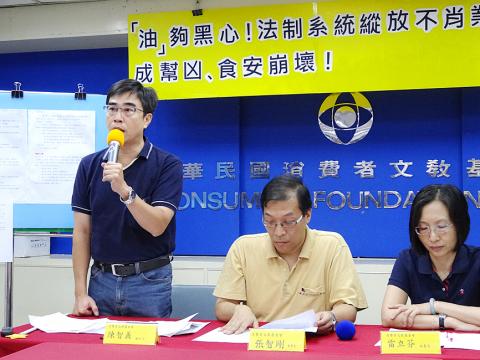The Consumers’ Foundation yesterday accused President Ma Ying-jeou’s (馬英九) administration of turning a blind eye toward business owners in the edible oil industry, adding that Minister of Health and Welfare Chiu Wen-ta (邱文達) and Food and Drug Administration (FDA) Director-General Yeh Ming-kung (葉明功) should resign if the ministry continues to be lax in monitoring the industry.
The foundation’s Consumer Reports Magazine publisher Chen Chih-yi (陳智義) said current regulations stated that one crime does not merit multiple punitive measures, with criminal cases taking precedence over all other cases. As such, Chen, citing as an example the previous adulterated oil scandal implicating Chang Chi Foodstuff Factory Co (大統長基), said that though the ministry’s Administrative Appeal Committee imposed a NT$1.85 billion (US$61.7 million) fine for the administrative violation, the case was brought to court as a criminal offense, resulting in the company receiving just NT$38 million in fines and the ministry canceling its NT$1.85 billion fine, citing the principle of double jeopardy.
Consumers’ Foundation chairman Mark Chang (張智剛) asked whether edible oils were included in the FDA’s “Notice for food industry owners on items for inspection and least amount of inspection time,” or whether that applied only to aquaculture, meats and dairy products, food products holding additives and that were imported, and special nutrition products that have previously obtained inspection permits.

Photo: CNA
“Oils are an important part of daily consumption and are present in almost everything we eat,” Chang said, adding that the foundation has since last year — following Chang Chi’s adulterated oil scandal — called for certain items to be included in the inspections.
“Both Yeh and Chiu should step down if the situation continues to worsen and the ministry fails to step up inspection and control,” he added.
Among the firms affected in the latest scandal are Ve Wong Corp (味王) and the Gourmet Master Co (美食達人), which owns cafe and bakery chain 85°C (85度C).
This has strongly eroded consumers’ faith in food security, the foundation said.
Chang added that the involvement of Wei Chuan Foods Corp (味全食品工業) in both the Chang Chi adulterated oil scandal last year and the latest tainted oil scandal showed that the penalty system in the judiciary was no longer a deterrent for companies.
“Companies will continue as they have done because fines for criminal offenses are always lower than those for administrative offenses and the current regulations states that criminal charges takes precedence in legal procedure,” Chen said.
This hurts the civil servants who are tackling the matter and it is causing the power of the public and the safety of consumers to wither at their roots, because companies are likely to get only a slap on the wrist for their wrongdoings, Chen said.
The foundation called on the government to come up with a solution to the judicial penalties, adding that unless the government emphasizes penalties, its efforts to fight fake products are meaningless.
Chen said that in the Chang Chi case, the settlement called on the companies to reimburse both the downstream stores and the employees who were dismissed, but did not cover consumers.
The courts must help consumers instead of letting perpetrators of such incidents walk out on bail for a mere NT$50,000, Chen said.

The Taiwanese passport ranked 33rd in a global listing of passports by convenience this month, rising three places from last month’s ranking, but matching its position in January last year. The Henley Passport Index, an international ranking of passports by the number of designations its holder can travel to without a visa, showed that the Taiwan passport enables holders to travel to 139 countries and territories without a visa. Singapore’s passport was ranked the most powerful with visa-free access to 192 destinations out of 227, according to the index published on Tuesday by UK-based migration investment consultancy firm Henley and Partners. Japan’s and

NATIONAL SECURITY THREAT: An official said that Guan Guan’s comments had gone beyond the threshold of free speech, as she advocated for the destruction of the ROC China-born media influencer Guan Guan’s (關關) residency permit has been revoked for repeatedly posting pro-China content that threatens national security, the National Immigration Agency said yesterday. Guan Guan has said many controversial things in her videos posted to Douyin (抖音), including “the red flag will soon be painted all over Taiwan” and “Taiwan is an inseparable part of China,” while expressing hope for expedited “reunification.” The agency received multiple reports alleging that Guan Guan had advocated for armed reunification last year. After investigating, the agency last month issued a notice requiring her to appear and account for her actions. Guan Guan appeared as required,

Japan and the Philippines yesterday signed a defense pact that would allow the tax-free provision of ammunition, fuel, food and other necessities when their forces stage joint training to boost deterrence against China’s growing aggression in the region and to bolster their preparation for natural disasters. Japan has faced increasing political, trade and security tensions with China, which was angered by Japanese Prime Minister Sanae Takaichi’s remark that a Chinese attack on Taiwan would be a survival-threatening situation for Japan, triggering a military response. Japan and the Philippines have also had separate territorial conflicts with Beijing in the East and South China

A strong cold air mass is expected to arrive tonight, bringing a change in weather and a drop in temperature, the Central Weather Administration (CWA) said. The coldest time would be early on Thursday morning, with temperatures in some areas dipping as low as 8°C, it said. Daytime highs yesterday were 22°C to 24°C in northern and eastern Taiwan, and about 25°C to 28°C in the central and southern regions, it said. However, nighttime lows would dip to about 15°C to 16°C in central and northern Taiwan as well as the northeast, and 17°C to 19°C elsewhere, it said. Tropical Storm Nokaen, currently